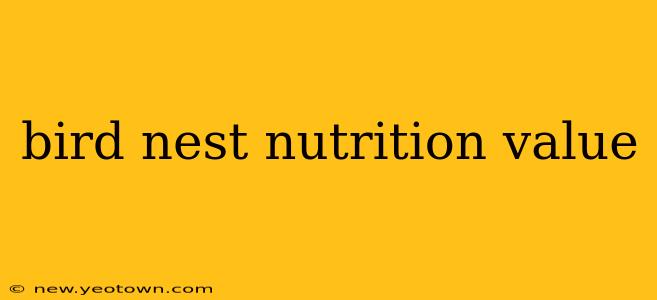For centuries, bird nests—specifically those made by swiftlets—have been prized as a culinary delicacy and a health tonic in Asian cultures. But beyond the mystique and high price tag, what's the real nutritional value of bird's nest? Let's unravel the secrets of this fascinating food.
Our journey into the world of bird nest nutrition begins with a story. Imagine a remote cave, high on a cliff face, echoing with the chirping calls of swiftlets. These tiny birds painstakingly construct their nests using saliva, a process that takes weeks, even months. It's this saliva, rich in proteins and glycoproteins, that forms the coveted edible bird's nest.
What are the Key Nutritional Components of Bird's Nest?
Bird's nest isn't a powerhouse of vitamins and minerals like some fruits and vegetables. Its nutritional value lies primarily in its unique composition of:
-
Proteins: Bird's nests are a significant source of protein, crucial for building and repairing tissues, making them a valuable supplement to a balanced diet. These proteins are particularly rich in amino acids, the building blocks of proteins.
-
Glycoproteins: These complex molecules are the star of the show. They are believed to contribute to many of the purported health benefits, although more research is needed. These glycoproteins are rich in sialic acid, which we'll discuss further below.
-
Minerals: Bird's nests contain trace amounts of minerals like calcium, iron, and potassium. However, these levels are not usually significant enough to make a substantial impact on daily mineral intake.
What are the purported health benefits of bird's nest?
For generations, bird's nests have been associated with various health benefits, passed down through oral traditions. While scientific evidence is still emerging, some of the purported benefits include:
-
Improved Skin Health: Some believe that the glycoproteins and amino acids contribute to improved skin elasticity and hydration, potentially slowing down the aging process.
-
Enhanced Immune System: The high protein content and specific components of the glycoproteins are thought to support immune function, although more research is needed to confirm these claims conclusively.
-
Respiratory Health: Traditional use suggests that bird's nests can help soothe respiratory ailments. However, scientific evidence to support this claim is limited and more rigorous studies are required.
What are the potential side effects of consuming bird's nest?
While generally considered safe, consuming bird's nest can carry some potential risks:
-
Allergies: As with any food, allergic reactions are possible. Individuals with sensitivities to seafood or bird products should exercise caution.
-
Contamination: The sourcing and processing of bird's nests can be a concern. Improper handling can lead to contamination with heavy metals or bacteria, hence the importance of purchasing from reputable suppliers.
-
Cost: The high cost of bird's nests makes it inaccessible to many people.
Is bird's nest suitable for pregnant women and babies?
This is a frequent question, and the answer is nuanced. While some traditional practices advocate for its consumption during pregnancy and for infants, there's limited scientific data to support or refute specific benefits. It is crucial to consult a doctor or healthcare professional before incorporating bird's nest into the diet of pregnant women or infants.
How much bird's nest should I consume?
There is no universally recommended daily intake of bird's nest. Consumption varies depending on individual preferences and health goals. Starting with small amounts and monitoring for any adverse reactions is advisable.
How can I tell if a bird's nest is high quality?
Identifying high-quality bird's nests requires expertise. Look for nests that are clean, light in color (indicating less processing), and have a distinct natural aroma. Reputable suppliers often provide certifications and detailed information on the sourcing and processing of their products.
The world of bird's nest nutrition is complex, intriguing, and still evolving. While the purported health benefits are compelling, it is essential to approach the consumption of bird's nest with a balanced perspective, informed by both tradition and emerging scientific evidence. Always prioritize a healthy, balanced diet and consult with a healthcare professional before making significant dietary changes, especially concerning pregnancy and infancy.

